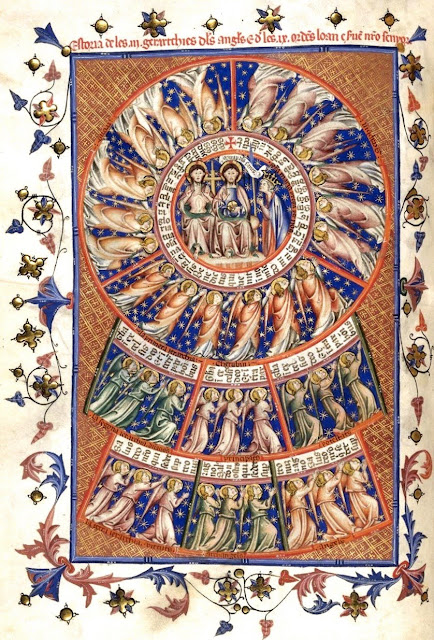 | |
| Mapping the US book deserts. A percentage of homes with at least 100 books. Interactive map can be found here. |
About this blog
I invite you to search, listen and observe with me for "the word of tree, whisper of stone, and humming together of the abyss and stars."
2022/01/20
Was Jesus illiterate?
2022/01/13
Revolution in Heaven
 |
| Nine classes of angels in three spheres depicted in a medieval manuscript. |
Have you heard about the revolution in heaven? Have you heard how Jesus overthrew the heavenly hierarchy?
First I need to explain the angelic hierarchy. The ancient polytheistic peoples were familiar with the notion of the divine court. Greeks situated it on Mt. Olympus. North West Semitic people looked up to Mt. Zaphon (modern Jebel Aqra). Of course the Hebrew Bible knew about Zaphon but there are also signs that Mt. Sinai, Mt. Zion or occasionally other mountains might play a similar role.
A deepening process of monotheisation under the prophets like Isaiah or Jeremiah led to less interest in the divine court. But then, it found its way in again during the late biblical period under the influence of apocalyptic writings such as Ezekiel or Daniel. In this stage, what used to be deities were replaced with throngs and retinues of angels. The angelic hierarchy was imagined and structured according to Hellenistic Royal Courts. Later the rabbis organised angels into no less than 10 classes or ranks. But the Jewish angelic hierarchy stayed rather fluent and even a little chaotic. For instance different cabalistic schools could have one class of angels, for instance Seraphim, in the highest rank as well as lowest rank and anything in between, depending on the author.
Roman Catholic medieval Scholasticism put angels in better order, probably inspired by needs of the medieval feudal church. Angels were organised in three large spheres and nine different classes. The highest sphere was for angels who were constantly in the presence of the divine and never left. Beneath them was the intermediary sphere of angelic functionaries mediating divine commands to the lower angelic sphere. The lowest angelic sphere was charged with execution of divine orders. Here were patrons of nations and royal houses, here were archangels in the second lowest class. Lower were only regular angels and the lowest of lowest of angels were the personal guardian angels, the blue collar angels, angelic proletarians.
Angelic hierarchy thus reflected medieval feudal structures of power but also represented the general human desire for order in the hierarchy of power. Image of heaven in Roman Church reflected medieval feudalism, in the Biblical times it reflected Hellenistic courts, among early Jews and pagans Zaphon, Sion or Olympus were perceived like Bronze Age royal palaces. (In heaven it was as it was on earth. When you think about it, it was the very opposite of one of the petitions of the Lord's Prayer.)
And then, Jesus, as was his well-established practice, turned this all upside down in one sentence. Matthew 18:10 in my loose rendition - Don’t even think to disregard and neglect the powerless, I tell you, their guardian angels have direct access to God. (My loose translation.)
The lowest, worldly, working angels, that angelic proletariat has direct access to God! That is revolution in heaven. As if Jesus said, Stop projecting your human corrupt power structures to heaven! Rather, change your human structures according to the egalitarian heavenly model which I bring and preach to you.
That is what I call the revolution in heaven. The overthrow of imaginary heavenly hierarchy and by the way the utter abrogation of heavenly and earthly feudalism or any other abusive power structures which humankind is so eager to create and recreate.
The first are last and last are first in heaven! And the first will be last and the last will be first in bright divine future. And you should start living it out now.
And that is something you might not know about the Bible and Jesus’ radical angelology.
Video version of this article can be found on Rutgers Church YouTube.
And here it is being explained to children in virtual Children Message